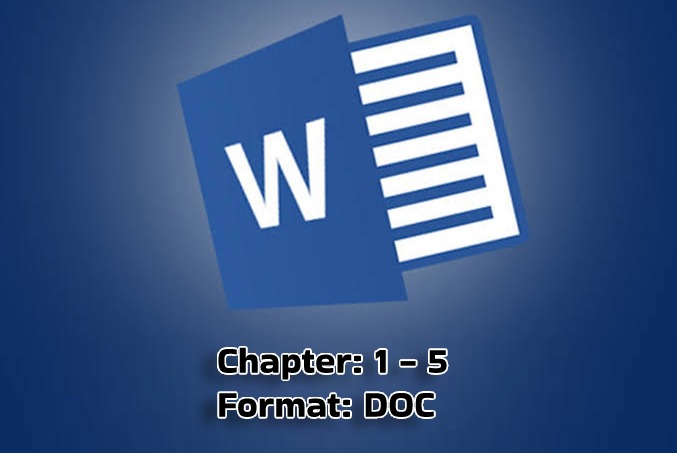Description
TABLE OF CONTENTS
Title page
Approval page
Dedication
Acknowledgement
Table of contents
Abstract
Chapter One
Introduction
1.1 Background of the Study
1.2 Statement of the Problem
1.3 Objective of the Study
1.4 Significant of the Study
1.5 Hypothesis
1.6 Scope and Limitation of the Study
Chapter Two
Review of Related Literature
2.1 Establishment of Local Government in Nigeria
2.2 Functions and Control of Local Government
2.3 Sources, Importance and Application of Local Government Revenue
2.4 Classification of Local government Revenue in Nigeria
2.5 Value Added Tax as a substantial source of revenue to Local
Government of the Federation
2.6 The Pathologies of Local Government Administration (Corruption and
Fraud)
Chapter Three
Research Design and Methodology
3.1 The Introduction
3.2 Research Method used
3.3 Source of Data
3.4 Population of the Study
3.5 Sample Size Calculation and Selection
3.6 Questionnaire Design
3.7 Questionnaire Administration and Collection
3.8 Data Analysis Technique
Chapter Four
Presentation, Analysis and Interpretation of Data
4.1 Introduction
4.2 Tabular Presentation, Descriptive Analysis and Interpretation of Data
from Primary Sources.
Chapter Five
Summary of Findings, Conclusions and Recommendations
5.1 Summary of Findings
5.2 Conclusions
5.3 Recommendations
Bibliography
Questionnaires
ABSTRACT
The management of revenue accruable in Nigerian Local government has
been a thing of concern to well meaning members of the society. This is
associated with the internal revenue source available to the local government,
its generation method, mode of expenditure by council chairman, lack of proper
auditing and accountability is achieved/seen to be the main problem of
persistent poor management of these funds.
The study carried out was used to appraise the existing managerial
methods of local government funds meant for providing infrastructure etc in the
rural areas as a third tier government.
The significance of the study is that; it x-rayed/reviewed the critical
issues in managing local government councils in Nigeria. This also helped in
providing information on the source and availability of funds to local
government councils in Nigeria.
The study covers Enugu South and Oji-River Local Government Areas of
Enugu State. Critical issues looked into in managing local government council
in Nigeria are; sources and availability of funds, regular and prompt payment of
staff salaries, pressure groups, community development, accountability probity,
etc.
The stud is expected to benefit the government, leaders at grass root and
well-meaning members of the society.
CHAPTER ONE
INTRODUCTION
1.1 BACKGROUND OF THE STUDY
The 1976 local government reform defined a local government as:
Government at local level examined through representative council
established by law to exercise specific powers within defined areas.
Theses powers conferred on them shall give the council substantial
powers and control over local affairs as well as the staff, institutional and
financial powers to initial and direct the provision of services to
determine and implement projects so as to complement the activities of
the state, and the federal government in their areas, and to ensure
thorough devolution of functions to these councils and through
participation of the people and their traditional institutions that local
initiative and response to local needs and conditions are maximized.
(Anambra State Government, 1976: 108)
On 1 st September 1976, the federal government of Nigeria created
local government on the following basis:
(1) In an area having a population of not less than 150, 000 persons.
(2) In an area containing a population not more that 800,000 persons.
(3) Not withstanding the provisions of paragraph (1) and (II) above,
where exceptional geographical, cultural and historical factors or any
other special circumstances exist in any particular case, a local
government area may be established not withstanding the member of
inhabitant of the area.
Thus, by the local government reforms of 1976 and its subsequent
reflection in the 1979 constitution, the government now becomes the
third tier of government in Nigeria. Hitherto, there were only tiers of
government, Federal and State/regional.
Currently, there are seven hundred and seventy four (774) local
government areas in Nigeria. The local government reforms sought to
bring governance to the doorsteps of the people. In furtherance of the
above objective, local governments in the country were made
autonomous. Thus, by this act, the local governments in the country now
have distinctive, exclusive and concurrent list of functions. Mandatory
functions which local councils must perform as the exclusive powers of
local government are making by-laws for or all the following, market,
motor parks, swage, slaughter houses, etc, while he permissive functions
which the local government may perform as concurrent powers of both
the local state government are as follows: health centers, primary and
adult education, rural and semi-urban water supply.
The decentralization of powers raises some critical issues in
administering local government councils. Such issues include sources
and availability of funds for carrying out its duties, regular and prompt
payment of staff salaries, goods and productive governance,
accountability, integrity, unbiased recruitment and staffing, meeting the
challenges of pressure groups, maintenance of law and order, community
development, efficient flow of information, socio-political cum economic
factors, meeting contractual obligations and environmental policy, etc.
These functions and critical issues require money in order to tackle
them successfully. It is the federal government councils in Nigeria over
the years the financial base of the local government councils in Nigeria
have been increased immensely, this, it was believed would serve as a
catalyst in Jump-Stating worthwhile development projects in these
councils. But this is yet to be so in most of these local governments
across the country, in spite of the enormous revenue that accrues to them.
Apart from the revenue that accrue to them from the federation
account and Value Added Tax (VAT).

